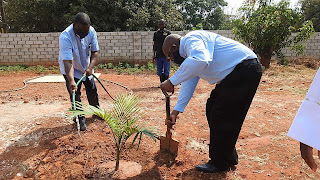AMECEA: Catholic Journalists Reminded the Significance of Content Production and Fact Checking
Sr. Jecinter Antoinette Okoth, FSSA
Catholic journalists in the Association of Member Episcopal Conferences in Eastern Africa (AMECEA) region have been asked to be careful of the content they produce for people’s consumption and disseminate credible information. 
Fr. Emmanuel Chimombo,
AMECEA Deputy Secretary General
Addressing radio managers in an online session that brought together participants from Uganda, Tanzania, Malawi, Zambia and Kenya, the Deputy Secretary General of AMECEA Fr. Emmanuel Chimombo said, “It is clear that “content is king.” If we get complaints on news items it is all about content.”
Furthermore, Fr. Chimombo who was giving an opening speech on behalf of the AMECEA Secretary General Fr. Anthony Makunde adds, “the circumstances can modify and even totally alter the morality (and) ethics of a production.”
Referencing a document Inter Mirifica, a decree made by Vatican II Council and promulgated by Pope Paul VI in 1963 on the Means of Social Communication, the Malawian cleric narrated that the concern of the Council was to enjoin upon all Catholics the importance of using social media responsibly, for the common good and to enhance the apostolic ministry of the Church.
The September 16-17, virtual session facilitated by Kenya Community Media Network (KCOMNET) focused on fact-checking, misinformation and content production to help journalist within the AMECEA region disseminate value- based information to the people.
Highlighting further the significance of Inter Mirifica in the Church, Fr. Chimombo who is also the AMECEA Pastoral Coordinator noted that the document underscores that the “principles of moral ethics must be applied to the media and that is the content in which each medium communicates and the circumstances in which the content is communicated.”
He adds, “The document also concentrates on the need to make apostolic use of all the means of social communication as tools of evangelization,” and that Catholics should be trained on the importance of the use of media, “coupled with a complete formation in the Christian spirit and especially with the Church’s social teaching.”
The priest bemoans the conflicting application of the Vatican document saying “Sadly, contemporary media, even in the Catholic world, rarely resembles what the Council envisioned. Often the spiritual and moral principles in the Decree on the Means of Social Communication and that of the AMECEA Founders have been observed too often only in the breach.”
Explaining to nearly 50 participants who were attending the session on what informed the training, the AMECEA Social Communications Coordinator Fr. Andrew Kaufa said that the Church leaders in the region observed during their 19th Plenary Assembly in 2018 that, “there is a dichotomy on what Christians do on Sunday when they gather in the Church and what they do in their day to day life.”
“The Christians tend to be very much devoted on Sunday but the same Christian act contrary when other days,” Fr. Kaufa explained.
He said that the Bishops resolved for the need to main stream issues in day to day life and bridge the realized gap so that “we are instrument of justice, instruments of good governance and accountability, and people who take care of the environment. In our faith nothing is secular nothing is Christian.”



Comments
Post a Comment